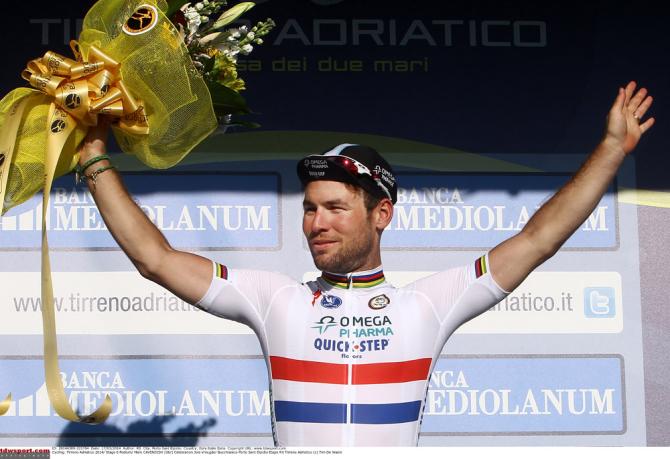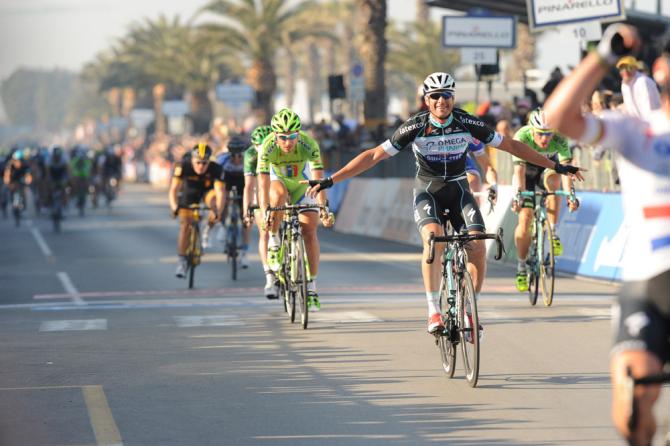Cavendish could be unbeatable in Milan-San Remo sprint, says Petacchi
Italian veteran on the Poggio and the Rubik's Cube


Alessandro Petacchi believes that Mark Cavendish will be "unbeatable" at Milan-San Remo on Sunday if he reaches the Poggio with three Omega Pharma-QuickStep teammates for company in the front group.
The 40-year-old is enjoying something of an Indian summer to his career after returning from a short-lived retirement last season to take on a new role piloting Cavendish in the sprints.
The strong Omega Pharma-QuickStep lead-out train looks to have hit its stride at the right time - they piloted Cavendish to an emphatic victory on the penultimate stage of Tirreno-Adriatico on Monday - and Petacchi is confident that they have the firepower to repeat the feat this weekend.
"I'm at the race to support my teammates, Cavendish in particular," Petacchi told Gazzetta dello Sport. "We're a very strong team: Stybar, Kwiatkowski, Renshaw, Trentin and me. If Mark has three of us near him on the Poggio, he'll become unbeatable. Did you see the sprint in Sant'Elpidio? Even before the crash, people were losing the wheels. We're going really well."
Indeed, such was QuickStep's dominance at Porto Sant'Elipidio that Petacchi was able to help himself to second place behind Cavendish after leading him out for the win. Although he downplayed the prospect of contesting the sprint for himself on the Lungomare Italo Calvino on Sunday, the 2005 Milan-San Remo winner believes that he can step up to the plate if Cavendish is dropped in the finale.
"Mark is our leader and I'm convinced that he will be there. But if the team needs me, I'm ready. Tirreno gave me an important confirmation. I know how to take my responsibility and I've never betrayed [team orders]. I'm setting out as if I was aiming to win, but I'll do whatever the team asks of me," Petacchi said.
"If I'm with the first riders coming down the Poggio, it will already be very satisfying. If I succeed in leading out Cav with 180 metres to go, it will be like I won myself. Then, if I were to finish first - it would be a fine mess."
The latest race content, interviews, features, reviews and expert buying guides, direct to your inbox!
Knowledge
Ten years ago, Petacchi entered Milan-San Remo as the outright favourite but discovered that a sprint after 300 kilometres is like no other on the calendar. He launched his effort from too far out and faded to fourth, while Oscar Freire famously pipped Erik Zabel on the line - the German had based his sprint on Petacchi and raised his arms in celebration too soon.
Twelve months later, however, Petacchi made no mistake in the sprint against Danilo Hondo and Thor Hushovd, and the man from La Spezia knows the peculiarities of Milan-San Remo like few others in Sunday's peloton.
"You've got one card to play and you pay if you get it wrong. You have to stay concentrated and hidden in the peloton right up to the decisive moment," said Petacchi, who explained the difference between the race's two final climbs.
"On the Poggio, even if you're tired, you can defend yourself. The important thing is to take it in front because otherwise on the hairpins at the bottom you get swept aside. On the other hand, on the Cipressa, if you don't have the legs, you get dropped. It's ideal for riders like me to start it in the top ten and then let yourself drop back a bit."
Cavendish, of course, already knows how to win Milan-San Remo himself, claiming the race at his first attempt in 2009, but there are some other lessons that he has been taking on board from his veteran roommate. A advocate of Sudoku as a means of preparing his mind for sprint finishes, Cavendish is now learning the intricacies of the Rubik's Cube from Petacchi, something of a self-taught guru.
"It's all about the algorithm. I've just set my record - 1:46 to complete it," Petacchi said. "I tried alone for a month, but it was impossible. Then I learned by following a video on the internet. And now I'm teaching him. He needs to understand the algorithm."

Barry Ryan was Head of Features at Cyclingnews. He has covered professional cycling since 2010, reporting from the Tour de France, Giro d’Italia and events from Argentina to Japan. His writing has appeared in The Independent, Procycling and Cycling Plus. He is the author of The Ascent: Sean Kelly, Stephen Roche and the Rise of Irish Cycling’s Golden Generation, published by Gill Books.